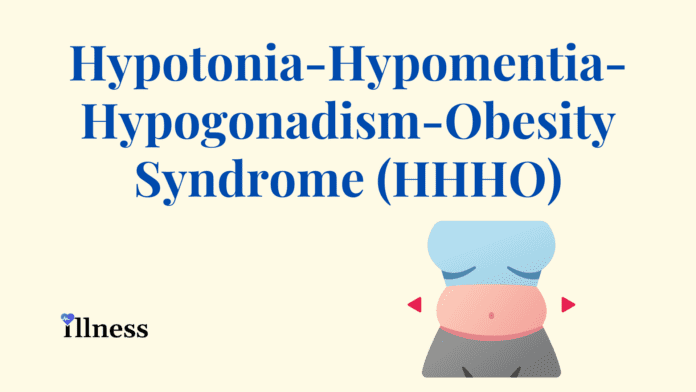Overview Of Hypotonia-Hypomentia-Hypogonadism-Obesity Syndrome (HHHO)
Hypotonia-Hypomentia-Hypogonadism-Obesity Syndrome (HHHO) occurs when the body’s sex glands produce little or no hormones. In men, these glands (gonads) are the testes. In women, these glands are the ovaries.
Commonly Associated With
Gonadal deficiency; Testicular failure; Ovarian failure; Testosterone – hypogonadism
Causes Of Hypotonia-Hypomentia-Hypogonadism-Obesity Syndrome (HHHO)
The cause of hypogonadism can be primary or central (secondary). In primary hypogonadism, the ovaries or testes themselves do not function properly.
Causes of primary hypogonadism include:
- Certain autoimmune disorders
- Genetic and developmental disorders
- Infection
- Liver and kidney disease
- Radiation
- Surgery
- Trauma
- The most common genetic disorders that cause primary hypogonadism are Turner syndrome (in women) and Klinefelter syndrome (in men).
If you already have other autoimmune disorders you may be at higher risk for autoimmune damage to the gonads. These can include disorders that affect the liver, adrenal glands, and thyroid glands, as well as type 1 diabetes.
In central hypogonadism, the centers in the brain that control the gonads (hypothalamus and pituitary) do not function properly.
Causes of central hypogonadism include:
- Anorexia nervosa
- Bleeding in the area of the pituitary
- Taking medicines, such as glucocorticoids and opiates
- Stopping anabolic steroids
- Genetic problems
- Infections
- Nutritional deficiencies
- Iron excess (hemochromatosis)
- Radiation
- Rapid, significant weight loss (including weight loss after bariatric surgery)
- Surgery
- Trauma
- Tumors
- A genetic cause of central hypogonadism is Kallmann syndrome. Many people with this condition also have a decreased sense of smell.
Menopause is the most common reason for hypogonadism. It is normal in all women and occurs on average around age 50. Testosterone levels decrease in men as they age, as well. The range of normal testosterone in the blood is much lower in a 50 to 60-year-old man than it is in a 20 to a 30-year-old man.
Symptoms Of Hypotonia-Hypomentia-Hypogonadism-Obesity Syndrome (HHHO)
Girls who have hypogonadism will not begin menstruating. Hypogonadism can affect breast development and height.
If hypogonadism occurs after puberty, symptoms in women include:
- Hot flashes
- Energy and mood changes
- Menstruation becomes irregular or stops
In boys, hypogonadism affects muscle, beard, genital and voice development. It also leads to growth problems. In men the symptoms are:
- Breast enlargement
- Muscle loss
- Decreased interest in sex (low libido)
If a pituitary or other brain tumor is present (central hypogonadism), there may be:
- Headaches or vision loss
- Milky breast discharge (from a prolactinoma)
- Symptoms of other hormonal deficiencies (such as hypothyroidism)
- The most common tumors affecting the pituitary are craniopharyngioma in children and prolactinoma adenomas in adults.
Exams & Tests
You may need to have tests to check:
- Estrogen level (women)
- Follicle-stimulating hormone (FSH level) and luteinizing hormone (LH) level
- Testosterone level (men)
- Other measures of pituitary function
Other tests may include:
- Blood tests for anemia and iron
- Genetic tests including a karyotype to check the chromosomal structure
- Prolactin level (milk hormone)
- Sperm count
- Thyroid tests
- Sometimes imaging tests are needed, such as a sonogram of the ovaries. If the pituitary disease is suspected, an MRI or CT scan of the brain may be done.
Treatment Of Hypotonia-Hypomentia-Hypogonadism-Obesity Syndrome (HHHO)
You may need to take hormone-based medicines. Estrogen and progesterone are used for girls and women. The medicines come in the form of a pill or skin patch. Testosterone is used for boys and men. The medicine can be given as a skin patch, skin gel, a solution applied to the armpit, a patch applied to the upper gum, or by injection.
For women who have not had their uterus removed, combination treatment with estrogen and progesterone may decrease the chance of developing endometrial cancer. Women with hypogonadism who have low sex drive may also be prescribed low-dose testosterone or another male hormone called dehydroepiandrosterone (DHEA).
In some women, injections or pills can be used to stimulate ovulation. Injections of pituitary hormone may be used to help men produce sperm. Other people may need surgery and radiation therapy if there is pituitary or hypothalamic cause of the disorder.



